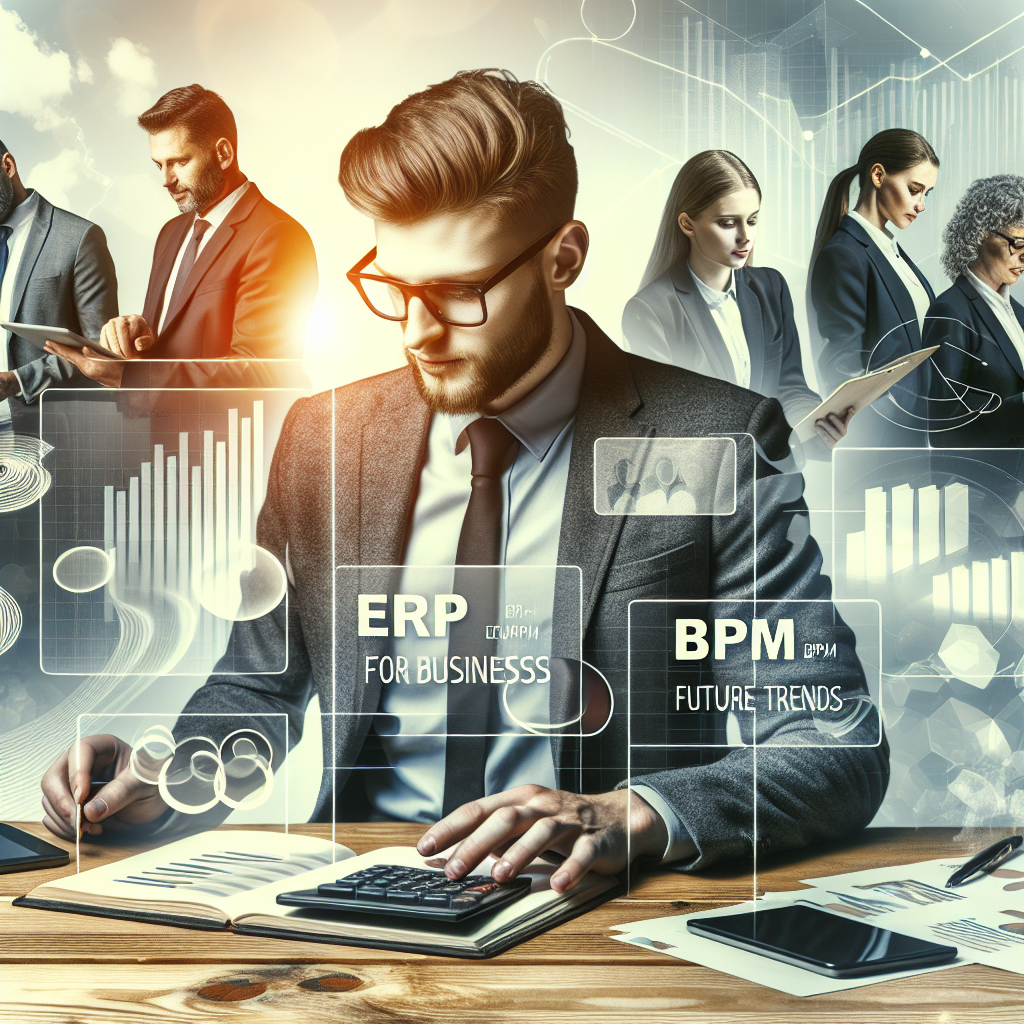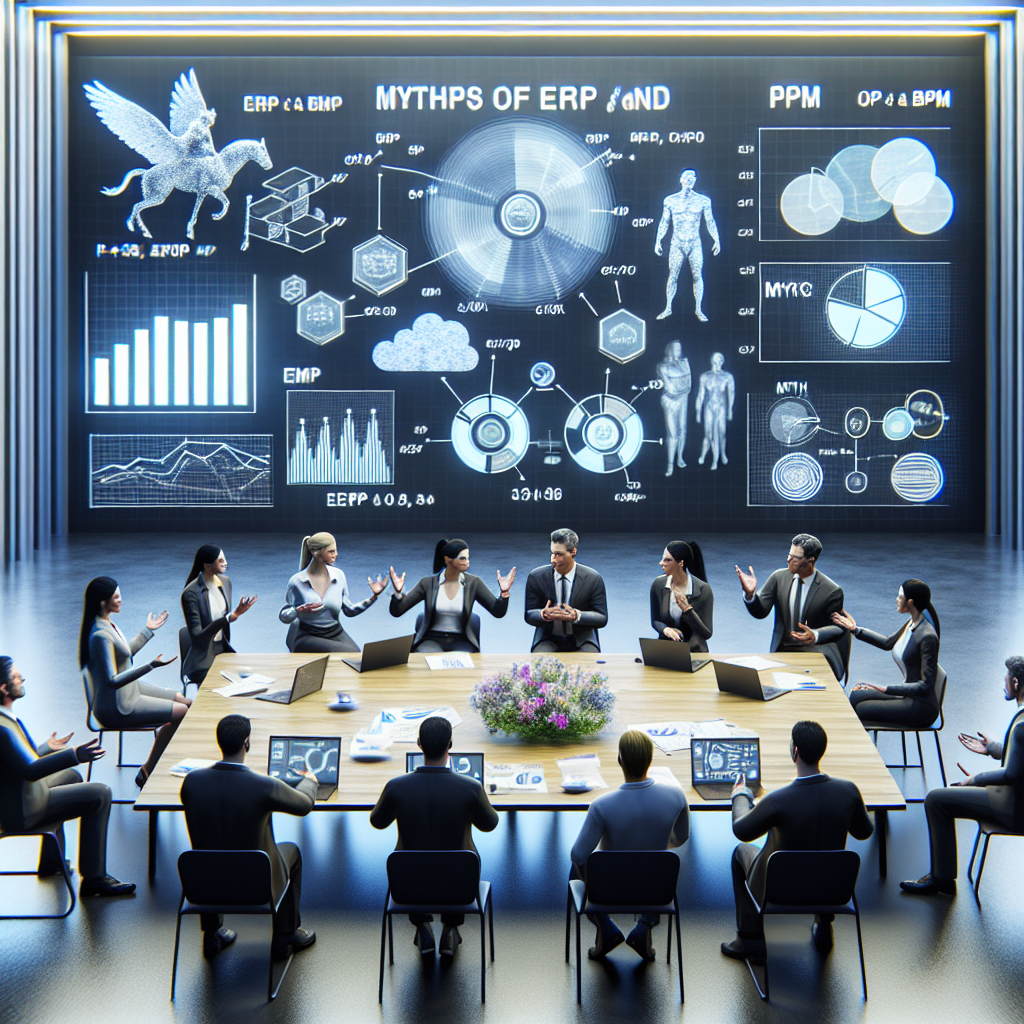Understanding the Differences Between ERPs and BPMs: All About Business Process Automations in 2025

What is the Difference Between ERP and BPM? Understanding the Essentials for Your Business

Are you puzzled about what is the difference between ERP and BPM? ⭐ Youre not alone! Many business owners and managers find themselves at a crossroads when deciding which software solution to implement to streamline their operations. Lets dive in and clear up the confusion between these often-interchangeable terms—Enterprise Resource Planning (ERP) and Business Process Management (BPM)—and help you decide what’s best for your company.
Decoding ERP ⭐
ERP software is like a powerful engine that integrates all the essential day-to-day functions of a business, such as finance, HR, supply chain, manufacturing, and services. Imagine running a bakery. An ERP system would allow you to track inventory, manage staff schedules, process orders, and even handle customer relationships from one platform. You won’t need to juggle multiple applications; everything you need is neatly packed into one suite. With over 80% of businesses using some form of ERP, its importance is undeniable! ⭐
Understanding BPM ⭐
BPM, on the other hand, is more about enhancing the processes that run your business. Think of it as a document creator that guides you through optimized workflows for better efficiency and productivity. Let’s take the previous bakery example again. If your order fulfillment process is slow and chaotic, a BPM tool can help map out that process, identify bottlenecks, and streamline operations to create a smoother workflow. According to recent studies, BPM can reduce operational costs by up to 30% when applied effectively. Thats significant! ⭐
Key Differences Between ERP and BPM ⭐
| Feature | ERP | BPM |
|---|---|---|
| Focus | Integrating core business functions | Optimizing business processes |
| Functionality | Finance, HR, Supply chain | Process mapping, analysis, improvement |
| Implementation | Complex; requires extensive training | Varied; tends to be more flexible |
| Outcome | Operational efficiency | Dynamic process improvements |
| User Base | Company-wide | Department-specific |
| Investment | Higher initial cost | Lower initial cost |
| Examples | SAP, Oracle | Bizagi, Appian |
| Scalability | Integrated, but can be rigid | Highly adaptive to change |
| Upgrades | Scheduled, generally infrequent | Continuous improvement |
| Goal | Unify processes | Enhance performance |
Real-Life Scenarios ⭐
Let’s talk about how real businesses handle the choice between ERP and BPM. Meet Anna, the manager of a mid-sized manufacturing firm. Anna implemented an ERP system and noticed immediate improvements in inventory management. However, she struggled with slow order processing. Thats when she brought in a BPM solution that allowed her team to identify waste in their processing chain, leading to a reduction in delivery times by 25%! Now, her customers are happier, and her bottom line is looking better than ever. ⭐
Then theres Mark, who runs an online retail store. Initially, he used BPM to streamline his customer service process. Soon, he faced challenges in managing finances, so he turned to an ERP solution. With both systems operating together, Mark experienced a 15% increase in productivity while reducing staff workload significantly. Thats two birds with one stone! ⭐
Expert Insights ⭐
To make an informed choice about what is the difference between ERP and BPM, its crucial to consult with experts like Alexandra from Artivale. With 20 years of experience and a dedicated team of professionals, we can help assess your needs and guide you to the right solution. Whether you choose an ERP system like SAP or BPM software like Bizagi, aligning your choice with your business goals will ensure you are set up for success.
In conclusion, remember that both ERP and BPM offer significant benefits but serve different purposes. Use ERP for comprehensive integration and BPM for specific process optimization. Either way, the right choice will empower you to enhance your business efficiency!
Ready to take the next step? ⭐ Contact us today at [email protected] or visit artivale.com. We provide all services in one place, from software development to technical support, ensuring hassle-free business operations. Dont hesitate—contact us now!
Frequently Asked Questions
- What is ERP? ERP stands for Enterprise Resource Planning, a type of software that helps businesses manage core processes.
- What is BPM? BPM stands for Business Process Management, focusing on improving business processes.
- Can ERP and BPM work together? Yes, they can complement each other, providing a more robust business management solution.
- What are the costs associated with ERP? ERP development typically starts around 12,000 EUR.
- How can BPM reduce operational costs? BPM identifies inefficiencies in processes which can lead to cost savings.
- Which businesses should use BPM? Any business looking to optimize specific processes, regardless of size.
- Are ERP systems complex to implement? Yes, they can be complex and often require significant training.
- What software options exist for BPM? Popular BPM tools include Bizagi and Appian.
- Does ERP help with customer relations? Yes, ERP can track customer data, enhancing customer relationship management.
- What industries benefit from ERP? Industries like manufacturing, retail, and healthcare can greatly benefit from ERP solutions.
How Business Process Automation in 2025 Will Transform ERP and BPM Dynamics

Are you curious about how business process automation in 2025 will impact the dynamics of ERP and BPM? ⭐ Youre in the right place! With rapid advancements in technology on the horizon, we’re on the brink of a transformation that could redefine how businesses operate. Let’s explore what’s coming and how you can prepare!
The Rise of Intelligent Automation ⭐
In 2025, business process automation is expected to become more intelligent. Next-generation automation tools will integrate artificial intelligence (AI) and machine learning (ML) into both ERP and BPM systems. Imagine your ERP software learning from past transactions: it could optimize inventory levels automatically, forecast cash flow, and even suggest procurement strategies based on sales predictions! Businesses will no longer rely solely on human intuition; data-driven decisions will become the norm.
Seamless Integration of Systems ⭐
Integration will evolve significantly. By 2025, expect ERP and BPM systems to share data in real-time, promoting a more seamless experience across different departments. For example, if marketing launches a new campaign, the B2B ERP software will automatically adjust inventory levels to align with increased expected demand, while BPM will streamline the fulfillment process to meet those demands without delay. This kind of harmony between systems will be a game changer!
Enhanced User Experience ⭐
The user experience within ERP and BPM systems will see a drastic transformation as well. In 2025, sophisticated user interfaces and mobile applications will allow employees to access information and make decisions on-the-go. This will empower teams to be more agile and responsive. Companies like yours will benefit from increased productivity as employees spend less time navigating complicated software and more time focusing on strategic initiatives.
Real-Life Scenario: The Future Bakery ⭐
Lets illustrate these advancements with a real-life scenario. Imagine Anna, our bakery manager, who upgraded her systems to integrate business process automation by 2025. With AI algorithms, her ERP can predict the ingredients needed based on past sales data, enabling smarter purchasing decisions. If demand spikes during the holiday season, the BPM system adjusts workflow processes automatically, reallocating resources to ensure timely deliveries. As a result, Anna not only meets customer expectations but enhances profitability with minimal manual intervention!
Important Metrics and Predictions ⭐
As we look ahead, research shows that organizations utilizing automation in their business processes could see a 30% increase in efficiency by 2025. In addition, companies that leverage AI within their ERP systems often report a 25% reduction in operational costs. This shows just how crucial these transformations will be for remaining competitive in your industry.
Expert Opinions on Automation Trends ⭐
Industry experts agree that the convergence of ERP and BPM with automation technologies will lead to unparalleled opportunities for businesses. Alexandra, our customer relations manager at Artivale, notes, "In 2025, companies who dont harness automation risk falling behind. Integrating these systems is the key to thriving in an increasingly data-driven world." Here at Artivale, we’re ready to guide you through these innovative changes!
Is Your Business Ready? ⭐
It’s clear that business process automation in 2025 will significantly transform ERP and BPM dynamics. But are you prepared? Companies often hesitate to adopt new technology because of cost or complexity, but investing in automation will ultimately pay off, giving you an edge in todays fast-paced environment.
Ready to embrace the future? ⭐ Contact us at [email protected] or visit artivale.com. Our professional specialists have over 20 years of experience and can help you navigate these changes to ensure your business is ahead of the curve. Lets make automation work for you!
Frequently Asked Questions
- What is business process automation? Its the use of technology to automate complex business processes and functions beyond conventional data manipulation.
- How will automation impact ERP systems? ERP systems will become more intelligent, learning from previous data and adapting to enhance business efficiencies.
- What role will AI play in BPM? AI will help in predicting workflow needs and automating adjustments for optimal process efficiencies.
- Will automation reduce costs? Yes! Companies embracing automation can expect to save up to 25% on operational costs.
- What industries will benefit most from automation? Every industry, including retail, manufacturing, and healthcare, can significantly benefit from automation enhancements.
- Is ERP integration complex? Initially, it may be; however, with proper guidance, the long-term benefits far outweigh the initial setup challenges.
- How can I prepare my business for automation? Start by assessing your current processes and determining areas where efficiency can be improved with automation.
- What metrics should I track with automation? Focus on efficiency, cost savings, and user satisfaction metrics to measure the impact of automation.
- Can small businesses benefit from ERP? Absolutely! ERP solutions can provide significant advantages regardless of the companys size.
- What is the best way to implement automation? Engage with experts, like those at Artivale, to tailor solutions that fit your unique business needs.
Debunking Common Myths: ERP vs BPM – What Your Company Needs to Know

When it comes to understanding ERP vs BPM, many myths cloud the decision-making process for businesses. ⭐ With the growing prevalence of both systems, its essential to separate fact from fiction. In this chapter, we’ll tackle the most common misconceptions about Enterprise Resource Planning (ERP) and Business Process Management (BPM) to help you make the best choice for your company!
Myth 1: ERP and BPM Are Essentially the Same ⭐
This is one of the biggest misconceptions. While both ERP and BPM software aim to improve efficiency within a company, they serve different purposes. ERP integrates all major business functions—from finance to inventory—into one cohesive system, while BPM focuses specifically on improving and managing workflow processes. Think of it like this: ERP is the backbone of your business, while BPM is the guide that ensures everything is running smoothly. ⭐
Myth 2: BPM is Just for Large Enterprises ⭐
Another common myth is that only large corporations can benefit from BPM solutions. In reality, BPM is highly adaptable and beneficial for businesses of all sizes! Whether you run a small family-owned bakery or a large manufacturing plant, BPM can help identify inefficiencies and optimize processes. For example, a small e-commerce business might use BPM to automate its customer service processes, improving response time and customer satisfaction. ⭐
Myth 3: Implementing ERP is Too Expensive for Small Businesses ⭐
Many small businesses believe that investing in an ERP system is financially out of reach. However, this is changing! With cloud-based ERP solutions now available, companies can access powerful tools at a fraction of the cost. In fact, research shows that companies implementing ERP report a 20% increase in efficiency, ultimately leading to greater profitability. Small businesses can leverage these systems to streamline operations without breaking the bank! ⭐
Myth 4: You Only Need One of Them, Never Both ⭐♂️
Some organizations mistakenly think they only need either an ERP or BPM solution. In truth, the two can work together beautifully! By integrating both systems, companies can harness the strengths of each to optimize overall performance. For instance, consider Anna, our bakery manager, again. With both ERP and BPM in place, she can efficiently manage inventory while also optimizing her baking and delivery processes. This way, Anna ensures high customer satisfaction and lowers operational costs simultaneously! ⭐
Myth 5: ERP Systems Are Only for Manufacturing Companies ⭐
While many manufacturing companies use ERP, this misconception overlooks the versatility of these systems. ERP can benefit various industries, including retail, healthcare, and logistics. For example, a retail company can utilize ERP to track customer transactions, manage inventory, and analyze sales data—all crucial for enhancing customer experience. The potential applications are vast and relevant across sectors. ⭐
Myth 6: BPM Is Only About Automation ⭐
While automation is a significant component of BPM, it’s not the sole focus. BPM encompasses end-to-end process management, including designing, modeling, execution, monitoring, and continual improvement of business processes. Automation is just one tool in the BPM toolbox. BPM helps businesses discover where improvements can be made, where automation is most effective, and how to empower teams overall. ⭐️
What You Really Need to Know ⭐
Understanding the distinctions between ERP and BPM can empower your company to make smarter business decisions. In conclusion, here are a few essential insights:
- ERP is about integration, while BPM focuses on process improvement.
- Businesses of all sizes can utilize BPM effectively.
- Cloud-based ERP options make implementation affordable for small businesses.
- Combining both systems offers the best of both worlds for optimized performance.
- ERP applications span various industries, not just manufacturing.
- BPM is about more than just automation; it also encompasses process improvements.
Ready for Your Business Transformation? ⭐
Don’t let misconceptions hold your business back! Reach out to us at [email protected] or visit artivale.com. With over 20 years of experience, our team of professional specialists at Artivale can guide you in selecting the right solutions tailored to your needs. Let’s debunk those myths and propel your business into success!
Frequently Asked Questions
- What is ERP? ERP stands for Enterprise Resource Planning, integrating core business processes into one system.
- What does BPM stand for? BPM stands for Business Process Management, focused on optimizing business workflows.
- Can small businesses use ERP systems? Yes! Many cloud-based ERP solutions are affordable for small businesses.
- Are ERP and BPM interchangeable? No, they serve different purposes but can complement each other.
- What industries use ERP? ERP solutions are used across various industries, including retail and healthcare.
- Is BPM only about automation? No, BPM involves comprehensive process management beyond just automating tasks.
- What’s the future of ERP and BPM? Expect increasing automation and integration, enhancing efficiency and analytics capabilities.
- How do I choose between ERP and BPM? Assess your organizations specific needs in integration versus process optimization.
- Can ERP systems help with customer relationships? Yes! They can track customer interactions and enhance management.
- What are the benefits of BPM? BPM can significantly improve organizational efficiency, process visibility, and accountability.
Submit your details in the form and our team will personally get in touch with you within the next business day to discuss your needs
